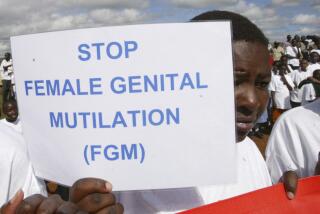With Too Few Voting, Effort to Ease Italian Fertility Law Fails
- Share via
ROME — In a victory for the Vatican but a setback for supporters of women’s reproductive rights, low turnout during two days of voting killed a referendum that would have lifted many limits in Italy’s restrictive fertility law, officials said Monday.
When the polls closed in the afternoon, only about 26% of eligible voters had cast ballots in a complicated, four-point referendum. Of the roughly 12 million people who did vote, at least three-quarters reportedly indicated that they wanted to overturn all or part of the year-old law that placed restrictions on fertility treatments, banned the use of donor sperm and eggs, and forbade research on embryonic stem cells.
In the bitter campaign ahead of balloting, Pope Benedict XVI endorsed Italy’s bishops in their call for Italians to abstain from voting on the referendum. The Roman Catholic Church approves of the stringent law and sought to keep it on the books by encouraging the boycott. More than half the electorate had to participate for the referendum to be valid.
Analysts were divided on whether the low turnout was an affirmation of the church’s ability to influence secular politics in Italy or whether indifference was really the winner. Referendums in Italy rarely prosper, and an election on a sunny Sunday in June had to compete with the beach and other distractions.
The polls were open 14 hours Sunday and eight hours Monday.
This nation is overwhelmingly Catholic, but the church’s influence has waned, and a majority of Italians say they do not attend Mass regularly. Abortion and divorce have been legal here for decades.
Opponents of the fertility law said they now feared the church would spearhead a campaign to have the abortion law overturned. Some activists noted that the fertility law seemed to contradict legalized abortion by giving rights to the embryo.
Italian politician Emma Bonino, former humanitarian aid commissioner for the European Union and a proponent of the referendum, said Monday she was disappointed.
“There are three victims here,” she said. “The secularism of the state, the state’s political autonomy and the institution of the referendum.”
Bonino predicted that more and more Italian women would be forced to seek treatment in other countries. Already, so-called procreation tourism has soared in popularity among Italians, with the number of women making such trips reported to have tripled since the stricter law went into effect last year.
Although Bonino and other supporters of more liberal reproduction laws said they would take the fight back to Parliament, a senior government official said the message of Monday’s defeat was clear.
With the “dimension of the victory of the abstainers,” said Cultural Affairs Minister Rocco Buttiglione, “it is evident that a very wide majority exists that confirms the law.” Italians, said the conservative Catholic politician, have refuted the “culture of nihilism” in support of life and religious values.
Cardinal Camillo Ruini, who as head of the Italian bishop’s conference championed the boycott, said Monday he was pleased with the results. He praised what he called the “maturity” of the Italian electorate.
Debate over the law on fertility procedures, considered the most restrictive in Europe, riveted Italians for weeks and drove deep wedges across traditional political lines. Catholic politicians on both the right and left heeded the church’s call to abstain, while others in those same parties made a point of voting. Several top officials split openly with their wives.
Prime Minister Silvio Berlusconi, whose wife supported changing the law, refused to say whether he voted.
And two senior members of the right-wing National Alliance, Berlusconi’s main partner in the governing coalition, stepped down from their posts Monday in protest over actions by Gianfranco Fini, their party leader and Italy’s foreign minister.
Fini stunned supporters several weeks ago by announcing he would vote in the referendum and saying he considered it improper for the church to attempt to intervene in secular affairs.
Fini on Monday rejected demands from some of his associates that he should resign from the party leadership.
More to Read
Sign up for Essential California
The most important California stories and recommendations in your inbox every morning.
You may occasionally receive promotional content from the Los Angeles Times.














